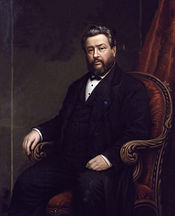 An All-Around Ministry, Charles Haddon Spurgeon. Prisbrary Publishing, 2012.
An All-Around Ministry, Charles Haddon Spurgeon. Prisbrary Publishing, 2012.
Summary: A collection of messages given by Charles Haddon Spurgeon as President of the Preachers College during their annual conferences.
Pastoral ministry has always been a demanding profession. If recent statistics are to believed, increasing numbers are struggling and as many as 1500 a month are leaving their ministries due to burnout, moral failure, or conflict. Fifty-seven percent indicate they would leave the ministry if they had somewhere else to go.
It appears that Charles Haddon Spurgeon, often called “the prince of preachers” was well aware of the challenges and pitfalls, as well as the glory of the ministerial calling. He trained a number of pastors in his Preachers College and annually gathered them at a conference over which he presided. An All Around Ministry is a collection of twelve of his addresses to this group.
His titles give some sense of the matters he dealt with in these addresses:
1. Faith
2. Forward!
3. Individuality, and Its Opposite
4. How to Meet the Evils of the Age
5. A New Departure
6. Light. Fire. Faith. Life. Love.
7. Strength in Weakness
8. What We Would Be
9. Stewards
10. The Evils of the Present Time, and Our Object, Necessities, and Encouragements
11. The Preacher’s Power, and the Conditions of Obtaining It
12. The Minister in these Times
His concern throughout was to address the ministerial calling. His message titled “Stewards” probably is the best summary of his sense of ministry as being a steward of an entrusted message, the gospel, and an entrusted task, to bring people to faith and nurture them in it. He writes, “There is great truth in the old proverb that ‘short reckonings make long friends.’ If we make short reckonings with God, we shall be long friends with Him.”
The messages are filled with advice for staying vital in one’s ministry through the practice of faith, the nurturing of spiritual disciplines that deepen one’s spiritual vigor, and lead to one’s being empowered of God for the work. He also warns of the dangers of deviating from personal holiness and doctrinal soundness. While he placed a high value on cogent oratory, he gave preachers this warning: “Perishing sinners do not want poetry, they want Christ.”
In reading these messages, one must understand that Spurgeon was a thoroughly persuaded evangelical of the Reformed perspective. The concerns he argued against in the “Down Grade Controversy” are evident here–a concern for deviation from biblical infallibility, the substitutionary atonement of Christ and the finality of judgment of the unrepentant. Nor does he have a kind word for Anglicanism and Catholicism.
What one does find in these addresses by Spurgeon is the voice of a pastor who has known weariness and discouragement as well as the glorious moments of fruitful ministry. He recognizes the forces both within and without that can derail one’s ministry. And he is one who has had to lean into the resources that come, not from within, but from above to “run and not be weary, to walk and not faint.” His message on “A New Departure” is all about pastoral renewal, as one example.
His seriousness about the pastoral calling is often punctuated with humor that is self-deprecating of the pastoral profession. At one point he writes:
“We must cultivate a cogent as well as a clear style; we must be forceful. Some imagine this consists in speaking loudly, but I can assure them they are in error. Nonsense does not improve by being bellowed.”
It occurs to me that a pastor or others in ministry might do well to read one of these messages by Spurgeon each month, perhaps as part of a pastoral retreat or a time of personal examination. At times the voice may seem strange, or even harsh, and yet the insights and questions he raises seem to me essential for long term faithfulness to one’s call.

I like reading Spurgeon. I remember one sermon in which he was discouraging orthodox Christians from engaging in public debates with those he considered to be heretics. He said that the downside to that is that, in such a case, people may first be learning about a heresy from the orthodox Christians’ lips!
LikeLiked by 1 person
Pingback: The Month in Reviews: August 2015 | Bob on Books